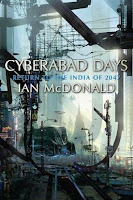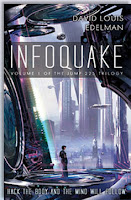Now, with the understanding that I am generalizing horribly, I think that traditionally a majority of filmic sci-fi is concerned with maintaining the status quo and getting the genies back in the bottles. Something is developed, approaching, on the loose – and its up to the protagonists to stop it. An asteroid is going to hit the earth, aliens are invading, a man has turned himself invisible and is running amok – how do we divert it, repel them, contain him… In other words, there is a threat to consensus reality and by the end of the film or television show, it’s been dealt with and nicely put away. Go on with your lives. Nothing to worry about here.
By contrast, literary science fiction is often set after such an event has already happened, sometimes a good deal after, and throws us in medias res into a world in which part of the fun of the narrative is working out how the world in the tale differs from the world we know and part of the theme lies in examining how these changes act as a lens to illuminate some aspect of humanity that we take for granted. So, an asteroid hit the earth and killed everyone over 18, how do the survivors cope? Aliens invaded and are now our overlords – would you let one date your sister? 1/3 of the population is invisible, what new class of people do they form? The intrusion isn’t repelled, it’s part and parcel of the way things are now going forward. I find this the more honest approach, and underscores on of science fiction’s strengths as the genre that embraces the reality and inevitability of change.
There are, of course, examples of both approaches in both mediums. In fact, one of the (many) failures of The Matrix trilogy is that it began from what I’m calling a more literary position of science fiction and transitioned to the filmic. At the end of the first movie, Neo promises to hang up the phone and, “then I’m going to show these people what you don’t want them to see. I’m going to show them a world … without you. A world without rules and controls, without borders or boundaries. A world where anything is possible.” The goal of the protagonists isn’t to preserve consensual reality, but to destroy it, by ushering in a world where anyone can do the things he can. But instead of this, the subsequent films shift the emphasis radically away from the Matrix (which is never anything more than a set for agents and rebels to play in henceforth) to saving Zion and restoring the status quo of balance between machine and rebel. We never actually deal with another person who still believes in/is imprisoned by the Matrix’s view of reality – and the battle that is fought is all about getting things back to the way they were in the first film. I don’t know why this is, though the best explanation I’ve heard is that 9/11 occurred between the first and second films, forcing Warner to rethink the wisdom of making two more movies staring a group of admitted terrorists out to destroy 1999. (In some ways, V for Vendetta – which was released as public opinion was beginning to change re: the current war and Bush’s approval ratings were dipping, and questioning him was no longer being seen as being unpatriotic – is the film the Wachowski’s should have made out of Matrix Reloaded and Revolutions and didn’t/couldn’t at the time). But I digress…
 To bring this back to the Jump 225 trilogy: What I personally love about Edelman is that he sets his story not before (and up to the point) of the radical transformation, nor after (and at a comfortable distance from) the transformation, but that he is actually charting the course through the societal singularity, showing how all the institutions of government, business, and society rearrange, realign, and topple. To an extent, Charlie Stross did this with his brilliant and essential Accelerando (though he moves his action off-world for a good deal of it – which is no criticism, it’s a different animal), but I’ve never personally encountered a work that did such a thorough job and concentrated so much of its focus in taking us through the shift point between paradigms. I think that’s why so many readers say that the future Edelman presents is a “believable” one, and why I think, though he mixes and matches tropes we’ve seen before, his approach is so unique.
To bring this back to the Jump 225 trilogy: What I personally love about Edelman is that he sets his story not before (and up to the point) of the radical transformation, nor after (and at a comfortable distance from) the transformation, but that he is actually charting the course through the societal singularity, showing how all the institutions of government, business, and society rearrange, realign, and topple. To an extent, Charlie Stross did this with his brilliant and essential Accelerando (though he moves his action off-world for a good deal of it – which is no criticism, it’s a different animal), but I’ve never personally encountered a work that did such a thorough job and concentrated so much of its focus in taking us through the shift point between paradigms. I think that’s why so many readers say that the future Edelman presents is a “believable” one, and why I think, though he mixes and matches tropes we’ve seen before, his approach is so unique.
 Three more Pyr books have appeared for the Kindle.
Three more Pyr books have appeared for the Kindle.






 But the best part of the whole thing is that Pat has seen fit, unprompted, to post this neat little Photoshopped poster that puts the full force and weight of Uncle Sam behind getting you to read Infoquake and MultiReal. And really, ain’t that how it should be?
But the best part of the whole thing is that Pat has seen fit, unprompted, to post this neat little Photoshopped poster that puts the full force and weight of Uncle Sam behind getting you to read Infoquake and MultiReal. And really, ain’t that how it should be?

